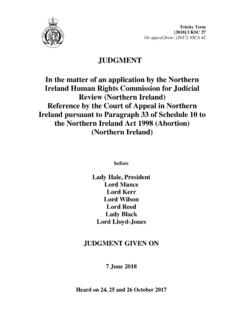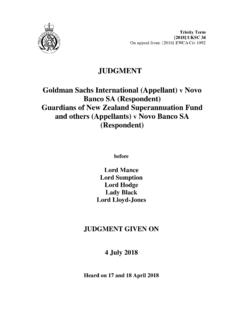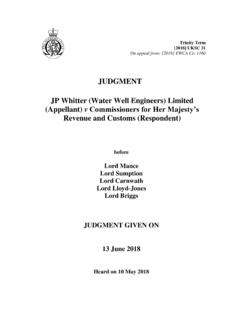Transcription of JUDGMENT P (by his litigation friend the Official Solicitor) v
1 Hilary Term [2014] UKSC 19 On appeal from: [2011] EWCA Civ 1257; [2011] EWCA Civ 190 JUDGMENT P (by his litigation friend the Official Solicitor) (Appellant) v cheshire west and Chester Council and another (Respondents) P and Q (by their litigation friend , the Official Solicitor) (Appellants) v Surrey County Council (Respondent) before Lord Neuberger, President Lady Hale, Deputy President Lord Kerr Lord Clarke Lord Sumption Lord Carnwath Lord Hodge JUDGMENT GIVEN ON 19 March 2014 Heard on 21, 22 and 23 October 2013 Appellant Respondent Richard Gordon QC Jenni Richards QC Simon Burrows Amy Street Neil Allen Peter Mant (Instructed by O Donnells Solicitors)
2 (Instructed by cheshire west and Chester Council Legal Services) 2nd Respondent Joseph O Brien Ian Goldsack (Instructed by Irwin Mitchell LLP) Appellant Respondent Richard Gordon QC Jenni Richards QC Fenella Morris Benjamin Tankel Neil Allen Peter Mant (Instructed by Steel & Shamash Solicitors) (Instructed by Surrey County Council Legal Services) Intervener Paul Bowen QC (Instructed by Equality and Human Rights Commission) Intervener (National Autistic Society and Mind) Ian Wise QC Stephen Broach Martha Spurrier (Instructed by Clifford Chance LLP) Intervener (The AIRE Centre) Elizabeth-Anne Gumbel QC Henry Witcomb Duncan Fairgrieve (Instructed by Leigh Day & Co) Page 2 LADY HALE (with whom Lord Sumption agrees) 1.
3 This case is about the criteria for judging whether the living arrangements made for a mentally incapacitated person amount to a deprivation of liberty. If they do, then the deprivation has to be authorised, either by a court or by the procedures known as the deprivation of liberty safeguards, set out in the Mental Capacity Act 2005 ( the Mental Capacity Act ). If they do not, no independent check is made on whether those arrangements are in the best interests of the mentally incapacitated person, although of course the health or social care bodies who make the arrangements do so in the hope and belief that they are the best which can practicably be devised.
4 It is no criticism of them if the safeguards are required. It is merely a recognition that human rights are for everyone, including the most disabled members of our community, and that those rights include the same right to liberty as has everyone else. The statutory background 2. The deprivation of liberty safeguards were introduced into the Mental Capacity Act by the Mental Health Act 2007. In a sense the wheel has turned full circle. Throughout the 19th century it was assumed that persons of unsound mind (then known as either lunatics or idiots ) should be kept in some form of confinement and reformers concentrated upon providing more and better institutions where they could live.
5 But it was also recognised that there was a risk of unjustified confinement and assumed that some form of judicial certification was the best protection against this. This was therefore the approach adopted under the Mental Deficiency Acts of 1913 and 1927, under which publicly funded institutions were established for people whose mental handicaps ranged from the severe (known as idiots ), through the moderate (known as imbeciles ), to the mild (known as feeble-minded ). Those Acts did not provide for a voluntary status for patients who were able to consent to their admission to hospital, nor did they provide for an informal status for those who lacked the capacity to consent but raised no objection to their admission.
6 However, unlike the institutions providing for people with mental illnesses, the institutions in question were not prohibited from admitting patients without formal certification. During the 1950s, therefore, this was first encouraged for patients admitted for a short time; and the Report of the Royal Commission on the Law relating to Mental Illness and Mental Deficiency 1954-1957 (chaired by Lord Percy), recommended that this could and should become the general practice without waiting for legislative reform (1957, Cmnd 169). Certification was seen, not only as bringing with it some stigma, but also as inconsistent with the goal of normalising the care and treatment of these patients Page 3 and bringing it into line with the care and treatment of people with physical disorders and disabilities.
7 3. A legislative basis for such informal admissions to hospital was provided by section 5(1) of the Mental Health Act 1959, now contained in section 131(1) of the Mental Health Act 1983 ( the 1983 Act ): Nothing in this Act shall be construed as preventing a patient who requires treatment for mental disorder from being admitted to any hospital or registered establishment in pursuance of arrangements made in that behalf and without any application, order or direction rendering him liable to be detained under this Act .. But that, of course, begged the question of the underlying law: on what legal basis could a person who lacked the capacity to decide to go into hospital or indeed anywhere else be admitted and treated there, whether for mental or physical disorder?
8 4. The answer came in the case of In re F (Mental Patient: Sterilisation) [1990] 2 AC 1. The House of Lords confirmed that there was no-one authorised by law to consent to treatment on behalf of an adult who lacked the capacity to consent for himself, nor was there any jurisdiction in the courts to give such consent. It was, however, lawful for him to be given such treatment and care as was necessary in his own best interests. In cases of doubt or dispute, moreover, the High Court could declare whether or not proposed treatment would be lawful. That principle has now been given statutory backing in section 5 of the Mental Capacity Act; as originally enacted, however, section 6(5) of the Act was designed to make it clear that this did not permit hospitals or other carers to deprive a person of his liberty.
9 This was prompted by the litigation concerning HL. 5. Quite how far the necessity principle might extend at common law was tested in the case of R v Bournewood Community and Mental Health NHS Trust, ex p L [1999] 1 AC 458. HL was autistic and profoundly mentally disabled. He had lived in a hospital for many years before being discharged to live with paid foster carers, Mr and Mrs E. One day he became agitated at his day centre and, as the foster carers could not be contacted, a social worker and doctor were called, he was sedated and taken to A & E, where he was examined by a psychiatrist. The psychiatrist assessed that he needed in-patient treatment, but by then he appeared fully compliant, and so he was admitted informally.
10 Although the plan was to return him to Mr and Mrs E as soon as the hospital staff thought it possible, their contact with him was restricted and he would have been prevented from leaving had he tried to do so. Habeas corpus and judicial review proceedings were brought on his behalf. These succeeded in the Page 4 Court of Appeal (whereupon HL was promptly sectioned under the Mental Health Act), but failed in the House of Lords. The majority held that the hospital had not detained him. Lord Nolan and Lord Steyn held that it had. Lord Steyn expressed himself with some force, at p 495: Counsel for the trust and the Secretary of State argued that L was in truth always free not to go to the hospital and subsequently to leave the hospital.













